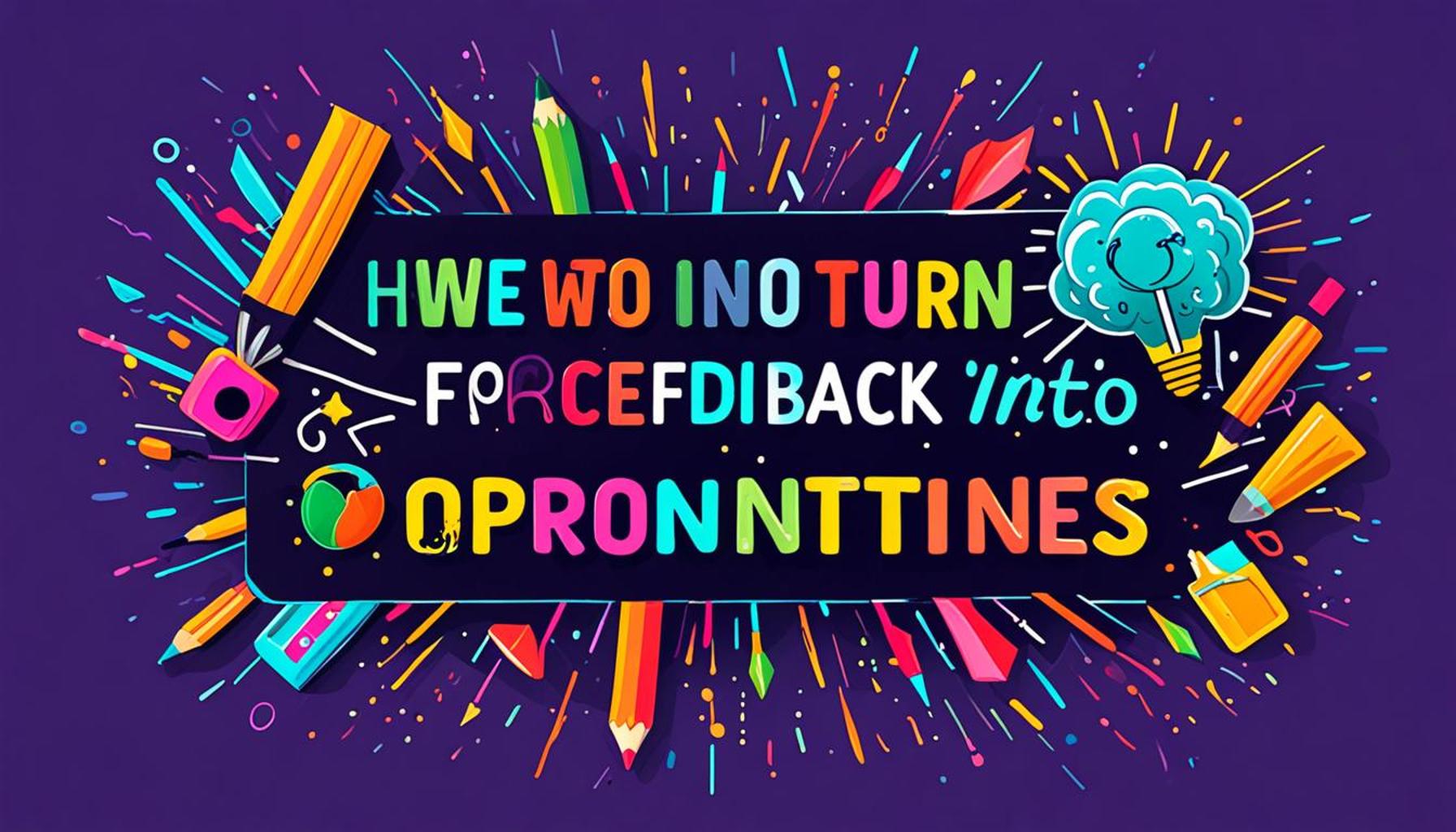How to Turn Negative Feedback into Learning Opportunities

The Importance of Embracing Negative Feedback
Negative feedback is often perceived as a setback, a stumbling block on the path to success. However, it can serve a greater purpose; it can be a powerful catalyst for personal and professional growth. Understanding how to harness this feedback effectively can lead to significant advancements in your career and personal development.
Here are some key reasons why embracing negative feedback is crucial:
- Identifies Weaknesses: Constructive criticism sheds light on areas needing improvement. Many professionals often overlook their shortcomings, but honest assessments from peers can illuminate blind spots that, if addressed, could propel them to greater success.
- Enhances Skills: Learning from feedback can guide skill enhancement. For instance, a software developer receiving input on coding errors can refine their techniques, leading to more efficient and cleaner code. This ongoing learning ultimately leads to better performance and growth in one’s field.
- Fosters Resilience: Handling criticism builds emotional strength and the ability to face challenges. When individuals encounter negative feedback and respond positively, they cultivate a resilient mindset that prepares them for future adversities.
In Nigeria, where vibrant opportunities exist alongside fierce competition, adapting to feedback is essential. For instance, receiving suggestions on your business approach can open doors to innovation. A local chef who actively seeks and implements customer reviews can refine their recipes and dining experience. Such adjustments may distinguish their Eatery in a competitive market, showcasing the importance of responding to public sentiment. Similarly, an entrepreneur who takes the time to adjust their business model based on customer feedback can ultimately lead to sustained success and higher profits.
Strategies for Transforming Feedback into Growth
To turn negative feedback into learning opportunities, one must adopt the right mindset. This includes:
- Listening Actively: Listen carefully to criticisms without initial judgment. Embrace the fact that feedback is a gift and recognize that it may provide insights you had yet to consider.
- Seeking Clarification: Don’t hesitate to ask questions for better understanding. Engaging in a dialogue can help ensure you are interpreting the feedback correctly and give you the chance to explore ways to implement suggestions.
- Implementing Changes: Utilize feedback to initiate positive changes in your practices. This can involve setting specific goals based on the feedback received and closely monitoring progress to measure improvement.
By shifting your perspective on criticism, you can elevate your skills and forge stronger connections with others. Recognizing that feedback is not merely an attack but rather an opportunity for enlightenment can lead you to thrive, both personally and professionally. This article will delve deeper into strategies for converting negativity into valuable lessons, ultimately leading to growth and success.
SEE ALSO: Click here to read another article
Transforming Criticism into Constructive Progress
To truly harness the potential of negative feedback, one must transition from a defensive stance to a proactive receptiveness. The initial reaction to criticism can often be emotional—perhaps even dismissive. However, cultivating a mindset that welcomes constructive feedback can be transformative. Here are some steps to effectively turn criticism into an advantage:
- Reflect and Internalize: After receiving negative feedback, take a moment to breathe and reflect. Rather than reacting impulsively, consider the validity of the criticism. Ask yourself whether there are elements of truth and how they apply to your performance. This reflection helps in internalizing the feedback, making it easier to adapt and grow.
- Separate Personal Feelings from Professional Feedback: It’s important to distinguish between personal feelings and professional evaluations. Negative comments are often about performance rather than personal attributes. Developing the ability to separate these can reduce defensiveness and allow for a more objective analysis of the feedback received.
- Document Your Feedback: Keeping a journal or log of feedback received can be invaluable. Document constructive criticisms, insights, and suggested improvements. This not only creates a reference point but also serves as a motivation to track your progress over time. In Nigeria’s competitive landscape, making data-driven adaptations is essential to staying relevant and effective.
Consider the example of local artisans in Nigeria, who often receive feedback on their crafts. A bead maker, for instance, may learn from customer input that certain colors or styles resonate more with buyers. By implementing changes based on this feedback, the artisan can enhance their appeal in the marketplace, increase sales, and foster a loyal customer base. This practice of adjusting based on received feedback can apply universally, from individual careers to enterprise-level strategies.
Furthermore, engaging with feedback actively often involves understanding the context and intent behind the criticism. This can lead to productive dialogues, allowing you to gather additional insights. By inviting the feedback provider to elaborate on their points, you can unearth underlying themes and gain a richer understanding of the aspects you need to improve.
Moreover, it’s crucial to approach subsequent interactions with an open mind. When colleagues provide feedback, they often have a genuine desire to see improvement. Recognizing this can foster teamwork and collaboration, laying the groundwork for a supportive environment that thrives on continual learning.
In Nigeria’s bustling business environments, responsiveness to feedback can differentiate you from others. Whether you’re a budding entrepreneur or an established professional, employing these strategies can help you evolve dynamically. In the following sections, we will explore further practical tools and methods to not just accept but also thrive on negative feedback, transforming it into a stepping stone for continuous improvement and innovative change.
Transforming Negative Feedback into Growth
Negative feedback, while often unsettling, can be a powerful catalyst for personal and professional growth. Engaging with criticism is essential in any journey of improvement. By reframing these experiences, individuals and organizations can glean valuable lessons that lead to enhanced practices, stronger relationships, and greater resilience.
Firstly, it’s crucial to actively listen to the feedback provided. This involves a genuine effort to understand the perspective of the feedback giver and reflect on their points. Sometimes, what initially seems harsh or unfair may contain kernel truths that, when examined closely, reveal opportunities for change. For instance, feedback about a product’s usability can lead to significant improvements, ultimately enhancing customer satisfaction and loyalty.
Moreover, seeking out feedback rather than waiting for it can be transformative. By proactively inviting input from peers and clients, individuals demonstrate a commitment to growth and continuous improvement. This approach not only opens up avenues for constructive dialogue but also fosters a culture of openness, learning, and collaboration.
| Advantages | Details |
|---|---|
| Enhanced Self-Awareness | Negative feedback often reveals blind spots, encouraging self-reflection. |
| Improved Processes | Criticism can guide revisions in processes and products, increasing overall effectiveness. |
| Stronger Relationships | Openness to feedback promotes trust and transparency among team members. |
Additionally, responding to feedback thoughtfully can foster relationships and reduce defensiveness. For example, when team leaders practice acknowledging and thanking individuals for their input, it validates their perspective and encourages further communication. This two-way engagement is vital for turning critical conversations into fruitful learning opportunities.
Ultimately, understanding and embracing negative feedback as a natural aspect of professional life can empower individuals. It sets the stage for continual learning and adaptation, reinforcing the idea that every piece of feedback is a step towards achieving greater excellence and quality in our endeavors.
CHECK OUT: Click here to explore more
Embracing a Growth-Oriented Mindset
Moving beyond the initial stages of processing criticism, it’s essential to cultivate a growth-oriented mindset. This approach encourages individuals to view negative feedback as opportunities for development rather than as setbacks. In Nigeria’s diverse professional landscape, this mindset can be a powerful catalyst for personal and professional advancement. Here are effective strategies to embrace this transformative mindset:
- Seek Out Diverse Perspectives: Actively solicit feedback from a variety of sources, including peers, mentors, and industry experts. This practice not only provides a broader perspective on your performance but also highlights different areas for improvement. For instance, an aspiring software developer in Nigeria might benefit from feedback not just from colleagues, but also from users who interact with their applications. These insights can reveal usability issues that one may not have recognized internally.
- Adjust Your Approach to Failure: Rather than viewing failure as a negative outcome, see it as a crucial step in the learning process. Emphasize experimenting and learning from mistakes in your daily tasks. For example, if a small business owner in Lagos tries a new marketing strategy that flops, analyzing this failure can teach valuable lessons about customer preferences and market dynamics.
- Set Specific Goals for Improvement: Upon receiving feedback, outline specific and actionable goals aimed at addressing the concerns raised. This may involve skill enhancement, time management, or effective communication. Using the SMART criteria—Specific, Measurable, Achievable, Relevant, Time-bound—when setting these goals can significantly enhance your ability to track progress and make necessary adjustments.
In practice, consider the case of a Nigerian journalist who receives criticism about their writing style being too technical for the average reader. Instead of feeling discouraged, they may choose to enroll in a writing workshop that focuses on simplifying complex ideas. Over time, not only does their writing improve, but they also connect better with their audience, thereby boosting their readership and credibility.
Additionally, embracing constructive feedback can lead to unexpected opportunities for networking and collaboration. By responding positively to criticism, you create pathways for mentorship and partnerships. Engaging with individuals who offer insights into your work can foster a community of support, where learning is a shared endeavor.
Active engagement with feedback also encourages accountability. When you express a desire to improve based on specific criticism, others are more likely to monitor your progress and provide further commentary. This creates a cycle of continuous improvement—a concept deeply ingrained in many successful businesses in Nigeria. Enterprises that welcome employee feedback often cultivate an environment where innovation thrives, leading to enhanced service delivery and customer satisfaction.
As you adopt this growth-oriented mindset, make it a habit to celebrate small victories that arise from your improvements. Acknowledging progress fuels motivation and encourages a culture of resilience, an essential trait for professionals navigating the vibrant and competitive markets of Nigeria.
RECOMMENDED: Check out this similar article
Conclusion: Transforming Criticism into Growth
In a world where feedback is ubiquitous, learning to turn negative feedback into actionable insights is crucial for personal and professional development. Embracing criticism as a vital component of growth empowers individuals to overcome challenges and refine their skills. This journey begins with cultivating a growth-oriented mindset, which encourages one to perceive feedback not as a setback but as a stepping stone to improvement.
By actively seeking diverse perspectives, adjusting our approach to failure, and setting specific improvement goals, we position ourselves to derive meaningful lessons from constructive criticism. For professionals in Nigeria, leveraging feedback from peers, mentors, and even clients can unveil unique insights that foster innovation and adaptability within various sectors. The case of the Nigerian journalist who transforms their writing through feedback is a testament to how evolving from criticism can lead to enhanced connection and engagement with audiences.
Ultimately, turning negative feedback into learning opportunities not only nurtures individual growth but also transforms organizational cultures, as seen in companies that prioritize open communication. By committing to continuous improvement and celebrating small achievements along the way, individuals can build resilience and become more prepared to navigate the dynamic and competitive landscapes of Nigeria’s market.
In the end, the ability to extract valuable lessons from criticism lays the groundwork for ongoing success. Developing a habit of welcoming and acting upon feedback ensures that we remain agile and responsive to change, thus driving our journey toward excellence.



